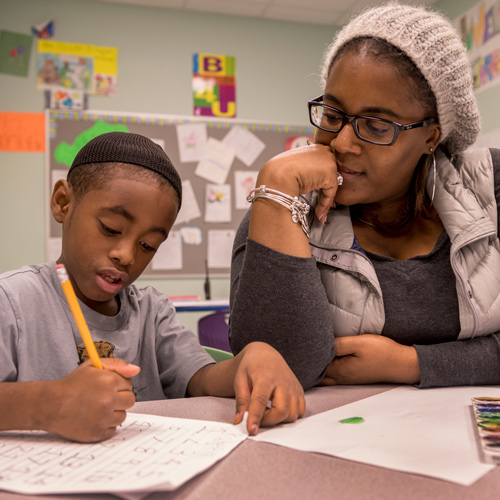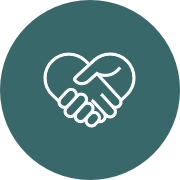
RHD’s Comeback Kids
Noah has been working with RHD’s Early Intervention for almost a year. Early Intervention provides treatment for infants, toddlers, and preschool-aged children identified as having an early childhood medical diagnosis or developmental delay. The program has a participation-based focus to work closely with families to enhance the developmental skills of their child.
“We’re very pleased,” said Noah’s mother, Jaime. “Noah has learned how to walk, and now walks at a faster pace. He’s learned how to speak more, and we didn’t have to find a separate speech therapist. Early Intervention has made a big difference for us.”
Early Intervention is just one example of how RHD has been a pioneer in creating unique programs for children. Thousands of children and their families have found caring, effective support at RHD that has helped them achieve their behavioral and educational goals.
“RHD really helped me and my family tremendously,” said Jerkisha, whose daughter is in an RHD program called High Fidelity Wraparound. “When my daughter first started the wraparound process she was making F’s in everything. Now she’s making A’s and B’s. HiFi helped me be a better parent to help my daughter. All the services were just great. I would recommend them to everybody.”
Click here for more information on RHD’s Children’s Services, including treatment methods, admission criteria and referral sources
“RHD’s children’s services continuum is very diverse,” said Sebrina Harrison, RHD Regional Director. “We’ve developed a good network of resources and we have the ability to provide different services based on the needs of different populations. Look at Mastery, an outpatient therapy program within Mastery Charter Schools, which is a unique service that’s not being done anywhere else. Or HiFi Wraparound, which was the first of its kind in Philadelphia. We’ve been able to pioneer effective and therapeutic services for children.
“But there are some ways in which RHD programs are similar, because of the way we want to deliver services. Family engagement is a huge initiative in all our programs, because we know we can’t treat the child in isolation. And being trauma-informed is extremely important.”
RHD’s Children’s Services have four main cornerstones:
Training: RHD staff receive the best and most up-to-date trainings available, so that RHD programs for children are always delivering most informed and highest quality service.
RHD programs work with the Philadelphia Department of Community Behavioral Health (CBH) to make sure RHD staff is prepared to provide services for children who often have acute behavioral health challenges. RHD staff at partial hospitalization programs go through a series of trainings with CBH that focus on crisis prevention/intervention/management, as well as clinical course formulation, treatment planning and clinical documentation. RHD staff goes through continuous trainings to best support the children each program serves.
“In all RHD educational programs, our teachers are certified teachers, and receive trainings and support through the school district just like every other district employee,” Harrison said.
Family Engagement: RHD believes that when a child is in crisis, the family is in crisis. Many RHD programs have parent workshops that teach how to de-escalate, and self-soothe. RHD’s approach is to move the children and their families from crisis together.
“RHD’s School Therapeutic Services program also has parent meetings in the schools, as a support to the traditional STS services we provide,” Harrison said. “We work to make sure families are aware of the service through ongoing meetings so that when a need arises they are already familiar with the program. The staff at STS goes out in the community and engages the family, provides evaluations in the homes and in the communities. We want families to be part of the process from the start.”
RHD’s HiFi Wraparound reports that children who stay with the program for 180 days or more achieve 80 percent of their behavioral and/or educational goals, and engaging the family is a primary reason.
“HiFi has a much better connection between the school and family life, and brings resources to help connect us to each other,” said Rebecca Delvin, a therapist at Roberto Clemente School. “Working with HiFi has helped resolve problems by getting everybody involved on the same page.”
Community Integration: RHD programs connect youth and families with opportunities that strengthen their natural support systems and create linkages that develop reciprocal relationships. Family members are connected to housing programs, parenting classes and community groups. Additionally, youth and family members participate in advocacy groups and workshops such as DBHIDS/CBH’s Family Member Committee and Parent Involved Network sponsored events and activities.
Educational and scholastic advancement: “Where kids enter an RHD program, we have collaborated with school officials to make sure we’re teaching grade-appropriate material, and we obtain Individualized Education Programs (IEPs) from the school district so we know what supports the children need to ensure continuity in their education,” Harrison said. “We work closely with the school district to make sure children maintain their grades. We don’t want kids to go back to their schools feeling like they missed something academically just because they had to deal with a crisis.”
Stepping Stones is the only long-term Partial Hospitalization Program (PHP) in Philadelphia that serves children with a history of emotional and behavioral challenges. Last year Stepping Stones was able to add a new a new Interactive Learning and Technology Center thanks to a gift from National Penn, and saw significant dividends. Student vocabulary and comprehension increased by 1.0 grade levels and math scores increased 0.8 grade levels.
That record of success is why RHD Children’s programs keep expanding, growing both in terms of the number of children RHD is able to serve and the kinds of supports RHD can offer. Early Intervention, for example, has expanded in terms of the ages it can serve and received consistently positive feedback from families.
“RHD has done a really good job,” said Erica, whose son Kori is in the Early Intervention program. “Kori is able to do a lot more. I would recommend them to anyone.”
That doesn’t come easily, or quickly. Sade Edwards, Program Supervisor at Early Intervention, spent weeks working with a child named Anthony who needed assistance with speech but was reluctant to engage with her.
“When I tried to interact with him he would shut down,” Edwards said. “I decided I would sit within Anthony’s eyesight and engage in activities with his classmates while using them as intermediaries to get responses out of Anthony. Over time Anthony would interact with me periodically, but always seemed to need time to warm up.
“Then one day when I walked in, Anthony came right up to me, said “Hi,” took my hand and said ‘Come on,’ and then directed me to sit on floor with him to play. He and I played and talked together for the entire session. If you give Anthony time, he can now respond to any request. He’s engaging with his teachers and making great strides. With patience and time, you can make great achievements happen.”


